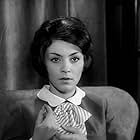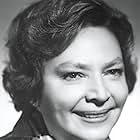VALUTAZIONE IMDb
7,6/10
14.437
LA TUA VALUTAZIONE
Nella stazione di un piccolo villaggio, un apprendista capostazione cerca di raggiungere l’iniziazione sessuale, ma quando fallisce miseramente, si scoraggia profondamente.Nella stazione di un piccolo villaggio, un apprendista capostazione cerca di raggiungere l’iniziazione sessuale, ma quando fallisce miseramente, si scoraggia profondamente.Nella stazione di un piccolo villaggio, un apprendista capostazione cerca di raggiungere l’iniziazione sessuale, ma quando fallisce miseramente, si scoraggia profondamente.
- Vincitore di 1 Oscar
- 2 vittorie e 6 candidature totali
Jitka Scoffin
- Mása
- (as Jitka Bendová)
Václav Fiser
- Zedník
- (as V. Fiser)
Karel Hovorka
- Hradlar
- (as K. Hovorka)
Jirí Kodet
- SS-man
- (as J. Kodet)
Frantisek Husák
- SS-man
- (as F. Husák)
Trama
Lo sapevi?
- QuizAs of 2022 the train station still stands, and in 2017 a museum was opened there to commemorate this film. It also still used as an active passenger train station.
- BlooperAt the beginning, the "German" tank shown during the anecdote about Janos' grandfather is a Soviet SU-152 "tank killer" of WWII vintage.
- Citazioni
Milos Hrma: I'm Milos Hrma. I slit my wrists because they said I suffer from premature ejaculation. Actually I wilted like a lily, but I really am a man.
- ConnessioniEdited into CzechMate: In Search of Jirí Menzel (2018)
Recensione in evidenza
The reason to watch "Closely watched trains" again was the death of Jiri Menzel in september 2020. Jiri Menzel was part of the Czech new wave in the early '60s, of which Milos Forman was the main protagonist. The films of the directors of this movement were often not explicit political, but implicit they were socially critical nonetheless.
In both "Closely watched trains" and "The Firemen's Ball" (1967, Forman) the comrades are far from model workers. They prefer to be lazy above being tired. This is beautifully illustrated in the beginning scene of "Closely watched trains" in which main character Milos Hrma (Vaclav Neckar) prepares for his first working day on a minor train station, a job he selected because of the expected lack of workload.
In 1966 Menzel was not blamed for the implicit criticism in "Closely watched trains". In the first place the "Spring of Prague" was still going on and in the second place the story was situated during the Second World War and not during Communist domination. The situation had totally changed when "Larks on a string" (1969) was released. This time the "Spring of Prague" was over after the invasion in 1968 and the story was situated after the "liberation" from the Germans. After "Larks on a string" the career of Menzel came to a standstill. Worth mentioning is that both films were based on a novel by Bohumil Hrabal. Menzel liked to adapt books of this author to the screen.
Having not much to do during working hours, there is a lot of flirtation on the workplace. We can see that in "Loves of blonde" (1965, Milos Forman) as well as in "Closely watched trains". This is were the problems for Milos begin, because he suffers from premature ejaculation. This gives rise to performance anxiety towards that nice conductress he has an eye on. During the whole film there are sexual undertones, such as in the scene in which a peasant woman feeds up a goose by massaging his neck.
The combination of war time and coming of age shares "Closely watched trains" with "Lacombe Lucien" (1974, Louis Malle). In "Lacombe Lucien" the boy chooses the part of the Germans and abuses the power he obtained in this way against a Jewish girl. In "Closely watched trains" the boy choose to cooperatie with the resistance to prove that he is a real man. The end of the film is tragic and contrasts strongly with the bittersweet tone of the rest of the movie.
In both "Closely watched trains" and "The Firemen's Ball" (1967, Forman) the comrades are far from model workers. They prefer to be lazy above being tired. This is beautifully illustrated in the beginning scene of "Closely watched trains" in which main character Milos Hrma (Vaclav Neckar) prepares for his first working day on a minor train station, a job he selected because of the expected lack of workload.
In 1966 Menzel was not blamed for the implicit criticism in "Closely watched trains". In the first place the "Spring of Prague" was still going on and in the second place the story was situated during the Second World War and not during Communist domination. The situation had totally changed when "Larks on a string" (1969) was released. This time the "Spring of Prague" was over after the invasion in 1968 and the story was situated after the "liberation" from the Germans. After "Larks on a string" the career of Menzel came to a standstill. Worth mentioning is that both films were based on a novel by Bohumil Hrabal. Menzel liked to adapt books of this author to the screen.
Having not much to do during working hours, there is a lot of flirtation on the workplace. We can see that in "Loves of blonde" (1965, Milos Forman) as well as in "Closely watched trains". This is were the problems for Milos begin, because he suffers from premature ejaculation. This gives rise to performance anxiety towards that nice conductress he has an eye on. During the whole film there are sexual undertones, such as in the scene in which a peasant woman feeds up a goose by massaging his neck.
The combination of war time and coming of age shares "Closely watched trains" with "Lacombe Lucien" (1974, Louis Malle). In "Lacombe Lucien" the boy chooses the part of the Germans and abuses the power he obtained in this way against a Jewish girl. In "Closely watched trains" the boy choose to cooperatie with the resistance to prove that he is a real man. The end of the film is tragic and contrasts strongly with the bittersweet tone of the rest of the movie.
- frankde-jong
- 18 set 2020
- Permalink
I più visti
Accedi per valutare e creare un elenco di titoli salvati per ottenere consigli personalizzati
- How long is Closely Watched Trains?Powered by Alexa
Dettagli
Botteghino
- Lordo in tutto il mondo
- 34.198 USD
- Tempo di esecuzione1 ora 32 minuti
- Colore
- Mix di suoni
- Proporzioni
- 1.33 : 1
- 1.66 : 1
Contribuisci a questa pagina
Suggerisci una modifica o aggiungi i contenuti mancanti

Divario superiore
What is the Japanese language plot outline for Treni strettamente sorvegliati (1966)?
Rispondi



















